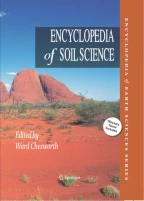
Soil mineralogy aims to study and understand the soil mineral phase, which makes up about 90% of the solid volume of mineral soils. This scientific discipline encompasses a diverse range of topics including: (i) the occurrence and distribution of soil mineral materials, (ii) their chemical composition, and crystallographic properties, (iii) the stability, transformations, and interactions of soil minerals in natural environments, and (iv) their consequent influence on soil physical and chemical properties and regulating air and water chemistry (Dixon and Schultze, 2002).
A soil mineral has a unique chemical formulation and crystal structure, though its chemical composition is not always fixed. Soil minerals have long been used to indicate weathering rates of surficial materials, determine the age of soils and sediments, elucidate mechanisms of soil formation, and reconstruct paleoenvironmental conditions during pedogenesis (Velbel, 1986;.